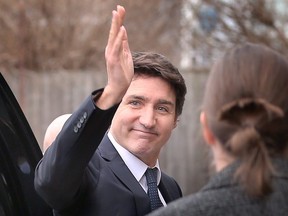FINLAYSON: Trudeau government unleashes massive spending and epic betting

Article content
The Trudeau government’s 2024 budget landed with a thud, evoking little enthusiasm and drawing spirited criticism from business leaders, investors, provincial premiers and (of course) the opposition parties. Several elements of the budget have garnered outsized attention, notably the pledge to run endless deficits, the imposition of higher capital gains taxes, and various new programs and policy initiatives intended to address Canada’s housing crisis.
But the budget includes a few eye-catching data points that have been downplayed in the subsequent political and media commentary.
One is the sheer size of the government.
The just-completed fiscal year marked a milestone, as Ottawa’s total spending reached half a trillion dollars ($498 billion, to be exact, excluding “actuarial losses”). According to the budget, the government will spend $95 billion more in 2024-25 than it planned only three years ago, underscoring the torrid pace of spending growth under Prime Minister Justin Trudeau.
One can legitimately ask whether the federal government has simply grown too big, complex and unwieldy to be managed at all, even if we assume the politicians in charge truly care about sound management. How many parliamentarians — or even cabinet ministers — have a sufficient understanding of the sprawling federal apparatus to provide meaningful oversight of the vast sums Ottawa is now spending?
The ArriveCan scandal and chronic problems with defence procurement are well-known, but how good a job is the government doing with routine expenditure programs and the delivery of services to Canadians?
The auditor general and the Parliamentary Budget Officer provide useful insights on these questions, but only in a selective way. Parliament itself tends to focus on things other than financial oversight, such as the daily theatre of question period and other topics conducive to quick hits on social media. Parliament isn’t particularly effective at holding the government to account for its overall expenditures, even though that ranks among its most important responsibilities.
RECOMMENDED VIDEO
A second data point from the budget concerns the fast-rising price tag for what the federal government classifies as “elderly benefits.”
Consisting mainly of Old Age Security and the Guaranteed Income Supplement, these programs are set to absorb $81 billion of federal tax dollars this year and $90 billion by 2026-27, compared to $69 billion just two years ago. Ottawa now spends substantially more on income transfers to seniors than it collects in GST revenues. At some point, a future government may find it necessary to reform elderly benefit programs to slow the relentless cost escalation.
Finally, the budget provides additional details on the Trudeau government’s epic bet that massive taxpayer-financed subsidies will kickstart the establishment of a major, commercially successful battery and electric vehicle manufacturing “supply chain” in Canada.
The government pledges to allocate “over $160 billion” to pay for its net-zero economic plan, including $93 billion in subsidies and incentives for battery, EV and other “clean” industries through 2034-35. This spending, the government insists, will “crowd in more private investment, securing Canada’s leadership” in the clean economy.
To say this is a high-risk industrial development strategy is an understatement. Canada is grappling with an economy-wide crisis of lagging business investment and stagnant productivity.
Faced with this, the government has chosen to direct hitherto unimaginable sums to support industries that make up a relatively small slice of the economy. Even if the plan succeeds, it won’t do much to address the bigger problems of weak private-sector investment and slumping productivity growth.
— Jock Finlayson is a senior fellow at the Fraser Institute











Postmedia is committed to maintaining a lively but civil forum for discussion. Please keep comments relevant and respectful. Comments may take up to an hour to appear on the site. You will receive an email if there is a reply to your comment, an update to a thread you follow or if a user you follow comments. Visit our Community Guidelines for more information.